No neutrons - Study guides, Class notes & Summaries
Looking for the best study guides, study notes and summaries about No neutrons? On this page you'll find 2739 study documents about No neutrons.
Page 2 out of 2.739 results
Sort by
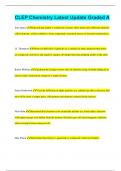
-
CLEP Chemistry Latest Update Graded A
- Exam (elaborations) • 25 pages • 2023
- Available in package deal
-
- $9.99
- 1x sold
- + learn more
CLEP Chemistry Latest Update Graded A John Dalton Proposed that matter is composed of atoms; these atoms have different identities called elements, which combine to form compounds; measured masses of reactants and products. J.J. Thompson Observed deflection of particles in a cathode ray tube; proposed that atoms are composed of positive and negative charges; developed the plum pudding model of the atom Robert Millikan Calculated the charge-to-mass ratio of electrons using oil drops falling in ...
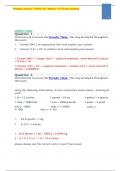
-
Portage Learning / CHEM 103 / Module 1 to 6 Exam answers 2023|2024 UPDATED A+ RATED
- Exam (elaborations) • 58 pages • 2023
-
- $12.49
- 3x sold
- + learn more
Click this link to access the Periodic Table. This may be helpful throughout the exam. 1. Convert 845.3 to exponential form and explain your answer. 2. Convert 3.21 x 10-5 to ordinary form and explain your answer. 1. Convert 845.3 = larger than 1 = positive exponent, move decimal 2 places = 8.453 x 102 2. Convert 3.21 x 10-5 = negative exponent = smaller than 1, move decimal 5 places = 0. Question 2 Click this link to access the Periodic Table. This may be helpful throughout the exam. ...
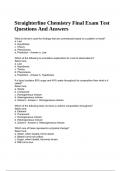
-
Straighterline Chemistry Final Exam Test Questions And Answers.
- Exam (elaborations) • 43 pages • 2023
-
- $11.49
- 1x sold
- + learn more
Straighterline Chemistry Final Exam Test Questions And Answers. What is the term used for findings that are summarized based on a pattern or trend? a. Law b. Hypothesis c. Theory d. Phenomena e. Prediction - Answer a. Law Which of the following is a tentative explanation for a set of observations? Select one: a. Law b. Hypothesis c. Theory d. Phenomena e. Prediction - Answer b. Hypothesis If a liquid contains 60% sugar and 40% water throughout its composition then what is it calle...
![AQA AQA GCSE CHEMISTRY 8462/1F Paper 1 Foundation Tier Version: 1.0 Final *JUN2384621F01* IB/M/Jun23/E11 8462/1FQUESTION PAPER & MARKING SCHEME/ [MERGED] Marl( scheme June 2023](/docpics/4428432/65c11b201bcd6_4428432_121_171.jpeg)
-
AQA AQA GCSE CHEMISTRY 8462/1F Paper 1 Foundation Tier Version: 1.0 Final *JUN2384621F01* IB/M/Jun23/E11 8462/1FQUESTION PAPER & MARKING SCHEME/ [MERGED] Marl( scheme June 2023
- Exam (elaborations) • 63 pages • 2024
- Available in package deal
-
- $9.99
- 1x sold
- + learn more
AQA GCSE CHEMISTRY 8462/1F Paper 1 Foundation Tier Version: 1.0 Final *JUN2384621F01* IB/M/Jun23/E11 8462/1F For Examiner’s Use Question Mark 1 2 3 4 5 6 7 8 9 10 11 TOTAL Monday 22 May 2023 Morning Time allowed: 1 hour 45 minutes Materials For this paper you must have: • a ruler • a scientific calculator • the periodic table (enclosed). Instructions • Use black ink or black ball-point pen. • Pencil should only be used for drawing. • Fill in the box...
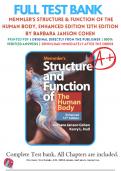
-
Test Bank for Memmlers Structure and Function of the Human Body 12th Edition by Cohen | Complete Guide A+
- Exam (elaborations) • 505 pages • 2024
-
- $19.99
- 2x sold
- + learn more
Test Bank Memmlers Structure and Function of the Human Body 12th Edition Cohen Chapter 01: Introduction to the Body MULTIPLE CHOICE 1. The word derived from two word parts that mean ―cutting apart‖ is a. physiology b. homeostasis c. anatomy d. dissection ANS: C DIF: Memorization REF: p. 3 OBJ: 1 TOP: Introduction 2. The study of how the body functions is called a. physiology b. homeostasis c. anatomy d. dissection ANS: A DIF: Memorization REF: p. 3 OBJ: 1 TOP: Introduction 3. The correct seq...
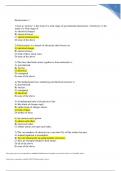
-
PHYS 1260 Exam 1 DeWitt questions and answers graded A+
- Exam (elaborations) • 6 pages • 2024
-
- $14.49
- 2x sold
- + learn more
Electrostatics 1 1) Just as "gravity" is the study of a wide range of gravitational interactions, "electricity" is the study of a wide range of A) electrical charges. B) electrical forces. C) electrical interactions. D) none of the above 2) Electrostatics is a branch of electricity that focuses on A) electrical charge. B) electrical force. C) both of these when static. D) none of the above 3) The force that binds atoms together to form molecules is A) gravitational. B) nucl...
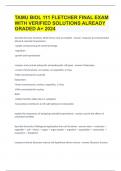
-
TAMU BIOL 111 FLETCHER FINAL EXAM WITH VERIFIED SOLUTIONS ALREADY GRADED A+
- Exam (elaborations) • 36 pages • 2023
- Available in package deal
-
- $14.99
- 1x sold
- + learn more
describe the basic functions all life forms must accomplish -response to environmental stimuli & maintain homeostasis -uptake and processing of nutrients/energy -regulation -growth and reproduction compare and contrast eukaryotic and prokaryotic cell types Prokaryotes: -circular chromosomes, no nucleus, no organelles, 3.5 bya -DNA concentrated in nucleoid Eukaryotes: -linear chromosomes, nucleus, organelles, 1.5 bya -DNA concentrated in nucleus Both: -cellular function takes p...
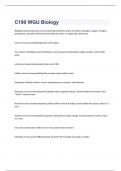
-
C190 WGU Biology exam 2023 with 100% correct answers
- Exam (elaborations) • 8 pages • 2023
- Available in package deal
-
- $13.49
- 1x sold
- + learn more
Biological macromolecules formed when atoms of carbon, hydrogen, oxygen, nitrogen, phosphorus, and other elements bond with each other in unique and varied ways Atom building blocks of all matter four classes of biological macromolecules carbohydrates, lipids, proteins, and nucleic acids cell fundamental, basic unit of life Matter anything that occupies space and has mass Subatomic Particles of Atom protons, neutrons, and electrons Electrons Subat...
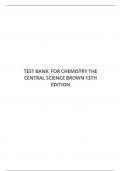
-
TEST BANK FOR CHEMISTRY THE CENTRAL SCIENCE BROWN 13TH EDITION
- Exam (elaborations) • 67 pages • 2023
-
- $10.00
- 3x sold
- + learn more
Chemistry: The Central Science, 13e (Brown et al.) Chapter 2 Atoms, Molecules, and Ions 2.1 Multiple-Choice Questions 1) A molecule of water contains hydrogen and oxygen in a 1:8 ratio by mass. This is a statement of . A) the law of multiple proportions B) the law of constant composition C) the law of conservation of mass D) the law of conservation of energy E) none of the above Answer: B Diff: 2 Var: 1 Page Ref: Sec. 2.1 LO: 2.1 GO: G2 2) Which one of the following is not one of t...
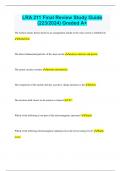
-
LRA 211 Final Review Study Guide (223/2024) Graded A+
- Exam (elaborations) • 9 pages • 2023
- Available in package deal
-
- $9.99
- 1x sold
- + learn more
LRA 211 Final Review Study Guide (223/2024) Graded A+ The earliest atomic theory based on an arrangement similar to the solar system is attributed to Rutherford. The three fundamental particles of the atom are the neutron, electron, and proton. The atomic nucleus contains protons and neutrons. The component of the nucleus that has a positive charge and mass is the proton. The electron shell closest to the nucleus is lettered "K". Which of the following is not part of the electromagnetic ...

How much did you already spend on Stuvia? Imagine there are plenty more of you out there paying for study notes, but this time YOU are the seller. Ka-ching! Discover all about earning on Stuvia


